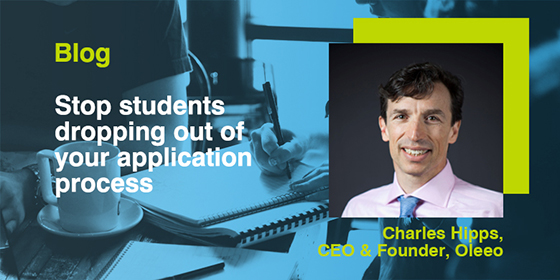Charles Hipps, CEO & Founder, Oleeo
Demand for jobs may be booming, but Oleeo research has found around a third of applications are incomplete or withdrawn, CEO and Founder Charles Hipps offers advice for preventing students dropping out.
Oleeo research found that the number of applicants per graduate scheme has reached an all-time high with companies within the financial and professional services sectors having to deal with over 250,000 applications and other sectors typically receiving applications from 50,000 graduates. Of these, between 30 and 40 per cent are incomplete or withdrawn applications.
How can employers better manage this booming demand and encourage applicants to not drop out of the application process?
Recruitment trends
For the second year Oleeo teamed with Universum to understand what students are looking for in selecting an employer and wanting to participate in an application process from start to finish.
The top five most attractive attribute preferences for candidates from recruiters were having leaders who will support development, a creative/dynamic workflow environment, high future earnings, clear path for advancement, and professional training and development.
Career goal messages around work/life balance, job security and stability and the ability to become a leader or manager of people, to be dedicated to a cause or to feel that they are serving a greater good and to be entrepreneurial or creative/innovative were the most highly desired among business students.
Universum’s wider data also revealed stark insights into what students expect to choose an employer as ideal for them including:
- 48% of students would not choose an employer as ideal if they did not know enough about them and 13% would be put off if they felt employers did not recruit from their school.
- Top drivers for choosing a graduate/rotational program included demonstrating business integration (52%), development opportunities (51%), mentorship (28%), leadership programs (36%) and having a variety of rotations (30%).
- Universally across all regions, students selected social media as the most used and most effective communication channel and Facebook as the best. Employer websites and career fairs were second and third in every study.
- The talent emerging from colleges is part of a generation that communicates digitally, at a frenetic pace. In fact, being connected to information virtually 24/7 is all they’ve ever known. And when they can’t find what they’re looking for quickly, they move on.
Communication matters
Understanding candidate expectations
For the latest data on how student employers are recruiting read the ISE Annual Student Recruitment Survey 2018


0 Comments